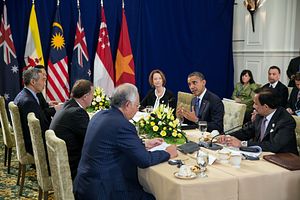Trade policy has taken a beating on the U.S. presidential campaign trail. It’s been blamed for the United States’ economic troubles and for creating the social strife and unease that has driven an unusually populist presidential campaign season. It’s a difficult context in which to pitch the Trans Pacific Partnership, one of the most ambitious trade agreements in history. But is the agreement doomed?
The difference between Republican and Democrat messaging on TPP is that Republican messages have been directed towards specific provisions like biologics or tobacco carve-outs from investor protection mechanisms. Republican calls to dismiss the agreement entirely usually come from the same members who voted against Trade Promotion Authority (TPA) and it makes sense that if they didn’t vote for TPA, they wouldn’t vote for TPP either. But critical comments from Mitch McConnell, Orrin Hatch, Paul Ryan, and others in leadership shouldn’t be interpreted as unequivocal opposition, or even opposition, so much as an expression that the White House should work with members to resolve outstanding issues and deliver Democratic votes to provide cover for Republican votes. Their comments sound bleak on the surface, but they’re offering a path for ratification.
What should be more troubling for free trade advocates is economic populism’s growing strength and Republicans, traditionally supportive of trade liberalization, have shown that they’re more willing to defect from business interests and the U.S. Chamber of Commerce more than they have in the past.
A startling example is Ohio Republican senator and former U.S. trade representative Rob Portman’s comment that he would oppose TPP. His position makes sense given that he’s campaigning in a close race in a manufacturing-heavy state where his opponent was using his trade record against him. Depending on the outcome of his campaign, it may be easier for him to change his position during the lame duck session at the end of the year. But even while Paul Ryan, Orrin Hatch, and other Republicans continue to support trade, Senator Portman’s position isn’t as much of an outlier as it might once have been and free traders within the party may find themselves open to greater scrutiny from increasingly anti-establishment voters.
Messaging from Democrats is usually more fundamentally critical of the entire agreement and trade policy in general. Hillary Clinton stated that she opposed TPP soon after the final agreement was announced, which was surprising given her involvement in negotiating the agreement when she was secretary of state. But, like Sen. Portman, she’s campaigning in a (closer than expected) primary race where organized labor’s support will be important. Early on, her statements would hedge (for example, saying that she doesn’t support TPP “as of today”), but she’s becoming increasingly unequivocal, such as telling the Oregon Fair Trade coalition that she’s against a TPP vote during the lame duck session.
But Clinton probably didn’t expect that the Republican challenger would attack her from the left as well. It’s hard to see unions abandoning the Democrats to support Trump, but his trade-skeptical message resonates among many who may ordinarily vote Democratic. Given that rust belt states like Ohio, Pennsylvania, and Michigan will be top targets for the Trump campaign, trade skepticism will continue to play strongly and will prevent Clinton from tacking to the center on TPP as many assumed she would.
Ownership of the ‘pivot’ to Asia more broadly might affect these calculations. Mark Landler’s new book about Obama and Clinton’s relationship during her tenure as secretary of state describes a competition between the White House and the State Department over who could claim authorship of the pivot strategy. Additionally, a recently released email of Hillary Clinton’s revealed her frustration that the White House was credited with being the first to use “pivot” to describe the administration’s Asia strategy. The possibility that Clinton would manipulate TPP’s ratification to guarantee her ownership of the policy would be, to say the least, dramatic and would require a level of pettiness that even her toughest critics would find unbelievable.
Still, it’s clear that the pivot, or ‘rebalance,’ is important to her and if she wants credit for it, then sooner or later she’ll need to square that with supporting TPP. She probably can’t do that on the campaign trail and it’s hard to imagine that she’d alienate unions soon into her presidency by making a TPP push immediately after coming into office. While she talks about a new model of trade, she hasn’t been clear on what she means, especially as that might pertain to TPP: There’s little to no appetite among the negotiating parties to reopen negotiations and TPP isn’t the only game in town for Asia. In other words, a new model of trade might be a good idea, but it’s probably too late for her to use TPP to explore that idea.
The Obama administration will be able to provide the political cover for pro-trade Democrats to support the TPP. The votes can be had in the lame duck session if the administration can find them by reaching agreements on contentious issues and probably by including support for displaced workers. A heavy lift, but doable. If the White House wants TPP to be a legacy issue for Obama’s presidency, the sooner that it works from the assumption that it’s the center of gravity, the better its chances.
So while international observers listening to some of the rhetoric coming out of the campaign trail and Washington may conclude that the TPP might be doomed, in reality there is still a chance that the administration can work together with willing Republicans and Democrats to ensure that the agreement is passed before Obama leaves office.
Paul Nadeau is an independent writer based in Tokyo, Japan.

































